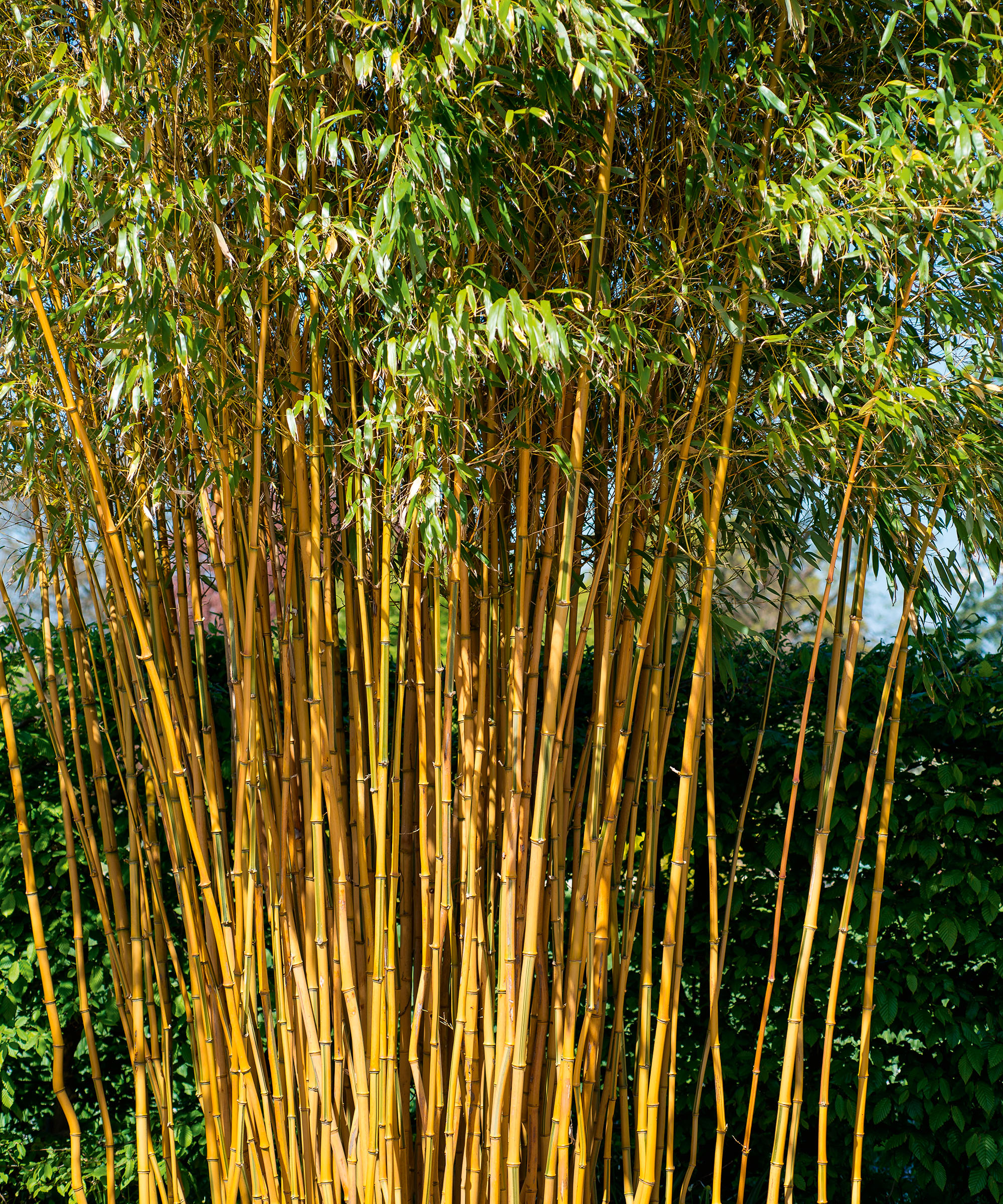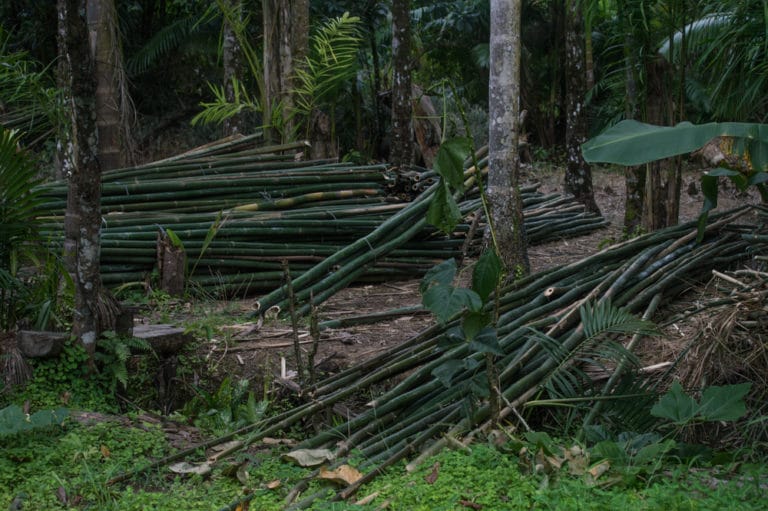The Bamboo Dilemma: Friend or Foe?
Now, let's talk about bamboo. Some people absolutely adore it. They love its sleek, elegant stalks and the way it sways gently in the breeze. But for many others, bamboo is the stuff of nightmares. Once it gets a foothold in your yard, it doesn’t play by the rules. Before you know it, it’s everywhere—spreading like wildfire through its underground rhizomes and turning your once peaceful garden into a jungle. But here's the good news: you don’t have to let bamboo run wild. There are clumping varieties of bamboo that stay put, slowly growing denser in the area where they’re planted without taking over your entire yard.
When Bamboo Goes Rogue: Containing the Spread
So, what happens when bamboo decides to go rogue and outgrow its designated space? Well, first things first, you’ve got to take control. One effective way to rein in an overzealous bamboo patch is by digging a trench around it. This trench should be about 30 centimeters deep and at least 30 centimeters away from the bamboo. Why? Because bamboo rhizomes can be sneaky little devils. They’ll try to sneak around your trench if you don’t give yourself enough space. Once the trench is dug, cut through any rhizomes you find and dig out any that have dared to venture beyond the boundary. It’s like putting up a fence to keep the bamboo where it belongs.
The Bamboo Backlash: Why Some Hate It
Let’s be real for a moment. Bamboo might start out as a cute little plant in the corner of your garden, but it can quickly become a monster. People start off loving it, thinking it’s the perfect addition to their landscape. Then, in about two weeks, they realize they can’t see their yard anymore—it’s all bamboo. And that’s when the panic sets in. They’re screaming into the void, asking anyone who’ll listen, “How do I kill this thing?” But fear not, because there are ways to naturally and effectively kill bamboo without resorting to drastic measures.
Read also:Embark On The Journey Of A Lifetime With Travelvidsxyz
Kill Bamboo Naturally: Heat and Light Deprivation
One of the simplest and most effective ways to kill bamboo naturally is by using heat and light deprivation. Bamboo, like any plant, needs sunlight to thrive. If you cut off its access to light, you’re essentially starving it. You can do this by covering the bamboo with heavy tarps or black plastic, ensuring no sunlight gets through. Over time, the bamboo will weaken and eventually die. Another method is boiling water. Yes, you heard that right—boiling water. Simply pour boiling water directly onto the bamboo shoots. It’s like giving the bamboo a scalding hot bath it won’t enjoy. This method works because the heat damages the plant’s cells, preventing it from growing.
Understanding Bamboo’s Underground Network
Here’s the thing about bamboo: it’s connected underground by rhizomes. These rhizomes are like the bamboo’s secret tunnels, allowing it to spread rapidly and efficiently. If you want to control bamboo, you’ve got to cut through those rhizomes. The easiest way to do this is by slicing them with the tip of a heavy shovel. It’s like severing the bamboo’s lifeline, keeping it contained to the area you want it in. This step is crucial if you’re trying to prevent bamboo from taking over your yard or encroaching on your neighbor’s property.
Managing Bamboo Pests: The Tiny Troublemakers
Now, let’s talk about bamboo mites. These little pests are native to Japan and they love nothing more than feeding on bamboo and other grasses in the bamboo family. Managing bamboo mites isn’t easy, but it’s definitely doable. You can learn more about controlling bamboo mites in the following article. But here’s a hint: prevention is key. Keeping your bamboo healthy and well-maintained can go a long way in deterring these pesky critters.
The Best Time to Take on Bamboo
When is the best time to tackle bamboo? Spring, my friends, is the season to strike. New bamboo shoots, called culms, grow between March and May. This makes spring the ideal time to attack bamboo and prevent it from spreading. If you’re thinking about hiring a professional to remove bamboo, be prepared for the cost. On average, homeowners pay between $425 and $1,850 for bamboo removal, depending on where you live and how much bamboo you’re dealing with. But don’t worry, there are plenty of DIY solutions that can save you money and give you back control of your yard.
Natural Solutions for Bamboo Control
One of the best natural ways to kill bamboo is with distilled white vinegar. Vinegar is highly acidic, and it can be a bamboo’s worst nightmare. Simply pour it onto the bamboo shoots and watch as it works its magic. If your bamboo grows in clumps, you’re in luck. Clumping bamboo doesn’t have the same aggressive rhizome system as running bamboo, making it much easier to eradicate. But if you’re dealing with running bamboo, you’ll need to be more strategic. Herbicides containing glyphosate can be effective, but they require careful application and multiple treatments to ensure the bamboo doesn’t come back with a vengeance.
Herbicides: The Chemical Option
For those who aren’t afraid of using chemicals, herbicides can be a powerful tool in the fight against bamboo. Glyphosate herbicides, also known as grass herbicides, are particularly effective. They work by targeting the bamboo’s root system, preventing new growth. But here’s the thing: bamboo is a hardy plant, so you’ll need to be persistent. One application won’t cut it—you’ll need to keep at it until the bamboo is completely gone. And always follow the instructions carefully to avoid damaging other plants in your yard.
Read also:King Von Autopsy Unveiling The Truth Behind A Tragic Loss
Bamboo in the Wild vs. Bamboo in Your Yard
In its natural habitat, bamboo is a beautiful plant. In Asia, where it originates, nature provides a balance of predators and diseases that keep bamboo in check. But here in the U.S., where it was introduced as an ornamental plant, there’s no natural system to contain it. Some varieties of bamboo, like golden bamboo, are considered invasive. This means they can spread rapidly and take over your yard if you’re not careful. But with the right strategies, you can keep bamboo under control and prevent it from becoming a problem.
Can Overwatering Kill Bamboo?
Now, here’s a question I get a lot: can overwatering kill bamboo? If you have bamboo in a pot or container, overwatering is actually one of the easiest ways to kill it. Bamboo doesn’t like soggy soil, so if you flood its roots, it won’t survive. But if your bamboo is planted in the garden, overwatering probably won’t have much of an effect. Bamboo is a tough plant, and it can handle a lot of water. So if you’re trying to kill bamboo in your yard, you’ll need to use other methods.
Common Mistakes People Make When Killing Bamboo
People make so many mistakes when trying to kill bamboo. They’ll chop it down, thinking that’s the end of it, only to find it sprouting back up a few weeks later. Or they’ll apply herbicides haphazardly, not realizing they need to target the roots. To truly kill bamboo, you’ve got to be thorough. You’ve got to cut it down, apply herbicides to the cut stems, and dig out the rhizomes. It’s a process, but it’s one that will pay off in the end.
Final Thoughts: Regaining Control of Your Yard
So there you have it, folks. Bamboo might be a beautiful plant, but it can also be a pain in the neck if it’s not managed properly. Whether you’re dealing with invasive bamboo species or just trying to keep it from spreading, there are plenty of effective methods to help you regain control of your yard. From natural solutions like vinegar and boiling water to chemical herbicides and physical barriers, you’ve got options. Stick with it, be persistent, and soon enough, you’ll have your yard back. And who knows? Maybe you’ll even come to appreciate bamboo in all its glory—just in a more controlled and manageable way.


